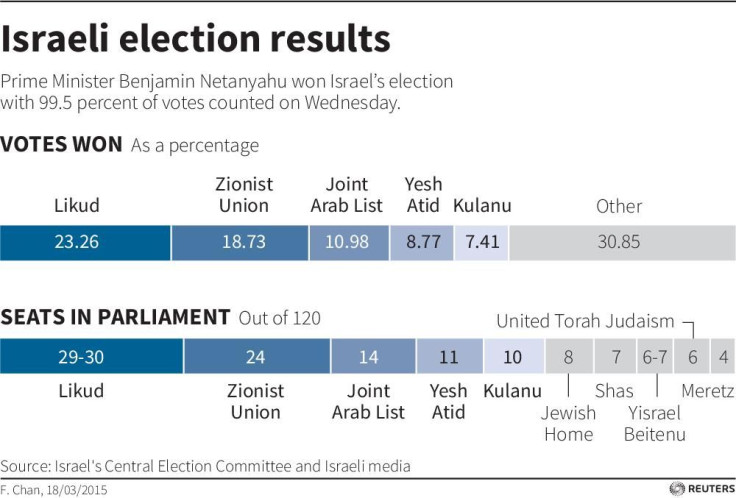
Israeli Prime Minister Benjamin Netanyahu won a second term yesterday as his Likud Party drew support from right-wing voters. The victory comes after a last-minute pledge to oppose a two-state solution giving statehood to Palestine, an adjacent territory that Israelis control militarily, but whose residents do not enjoy the rights citizenship. Palestinians demand their own state, a solution that is increasingly supported by the international community.
In the last days of the election Netanyahu told the conservative NRG that he would not support statehood. He said that his opponents would capitulate to international peace proposals, such as recognizing 1967 Israel/Palestine borders, and freezing Israeli settlements in areas considered Palestinian territory under the Oslo Accords.
"I think that anyone who moves to establish a Palestinian state and evacuate territory gives territory away to radical Islamist attacks against Israel," Netanyahu said. “[The Zionist Union party] would attach itself to the international community and do their bidding."
Zionist Union members lamented the outcome of the election, saying that it would be a barrier to restarting negotiations between Israel and Palestine.
"Regarding security, we all understand that there are challenges in the north and the south of Israel," Zionist Union MK Revital Swid told Al Jazeera. "But people want to see a start of negotiations [with the Palestinians] and putting the peace process back on track."
"Talking to our neighbors will bring a better life here," Swid added.
Palestinian officials were not so subtle and accused Netanyahu -- who used to make a point of being a centrist -- of pandering to the extreme and growing political right.
"The results of the Israeli elections show the success of a campaign platform based on settlements, racism, apartheid and the denial of fundamental human rights of the Palestinian people." Saeb Erakat, Palestine’s chief peace negotiator told CNN.
"Such a result would not have been possible had the international community held Israel to account for its systematic violations of international law," said Erakat, who works under Palestinian Authority President Mahmoud Abbas. Last summer, Israel mounted Operation Protective edge, an offensive aimed at suppressing sometimes-lethal rocket fire from Hamas militants in Gaza. Over 2,000 Palestinians were killed in bombings, including over 500 children.
Israel’s most recent blow to the Palestinians came in January, when it decided to withhold tax revenue that Israel collects on behalf of the Palestinian Authority. The sequester of $127 million dollars -- a significant portion of Palestine’s austere government budget -- came as punishment for the territory’s attempts to join the International Criminal Court, according to the Washington Post.
"We're opposed to any actions that raise tensions. And obviously, this is one that raises tensions," Jen Paski, State Department spokesperson, said of the funding freeze.
Testing The “Special Relationship”
An important part of the “international community” denounced by Netanyahu is the U.S., who have been crucial players in Israeli/Palestinian negotiations. Across administrations and party lines, the U.S. has long supported a two-state solution in which Palestinians have their own country. Psaki reaffirmed that view yesterday, as the elections commenced.
“Our view continues to be that the only way to have peace and stability in the region is for there to be a two-state solution,” she said.
While the U.S. and Israel have long enjoyed a “special relationship,” Netanyahu has tested the patience of American officials both with his style and substance. In 2010 he announced building more illegal settlements. Not only was the move contrary to American foreign policy, but he made the announcement during a visit by Vice President Joe Biden, putting the administration in a very difficult position.
"The announcement of the settlements on the very day that the vice president was there was insulting," said Hillary Clinton, then Secretary of State, according to the Washington Post.
Netanyahu pressed the White House’s buttons again in 2015 when he accepted an invitation from Republicans to address Congress. Though he claimed he had no intention of “politicizing” the U.S. relationship with Israel, the move was one in a series by Republican lawmakers to undermine President Barack Obama’s foreign policy, including an letter to Iran claiming his administration’s inability to make good on a peace deal. Still, the Obama administration maintains its support of Israel, and says that it’s ready to work with Netanyahu again.
“We look forward to working with the next Israeli Government, including on our shared agreement for peace and security in the Middle East,” Paski said.
© 2025 Latin Times. All rights reserved. Do not reproduce without permission.



